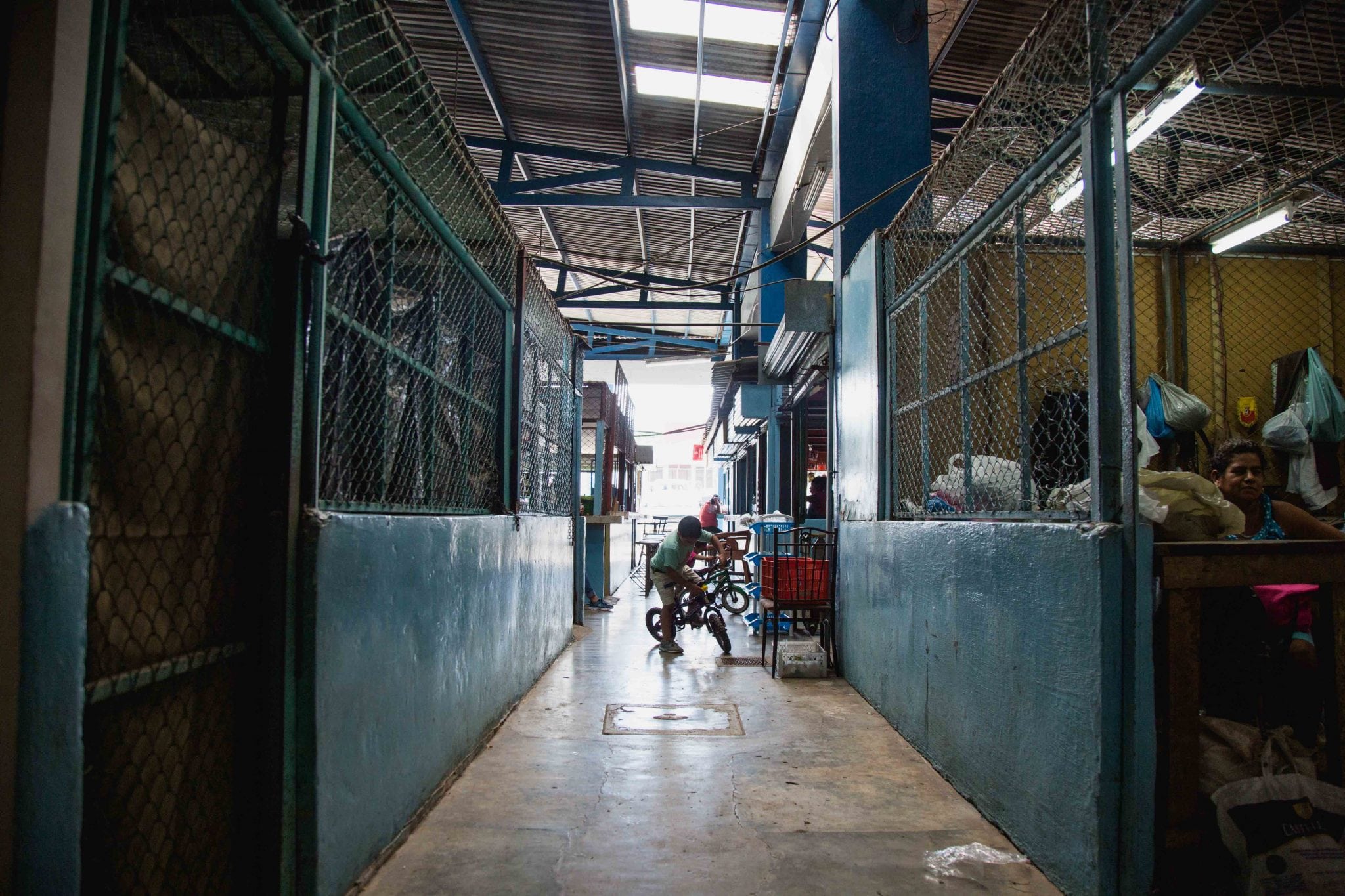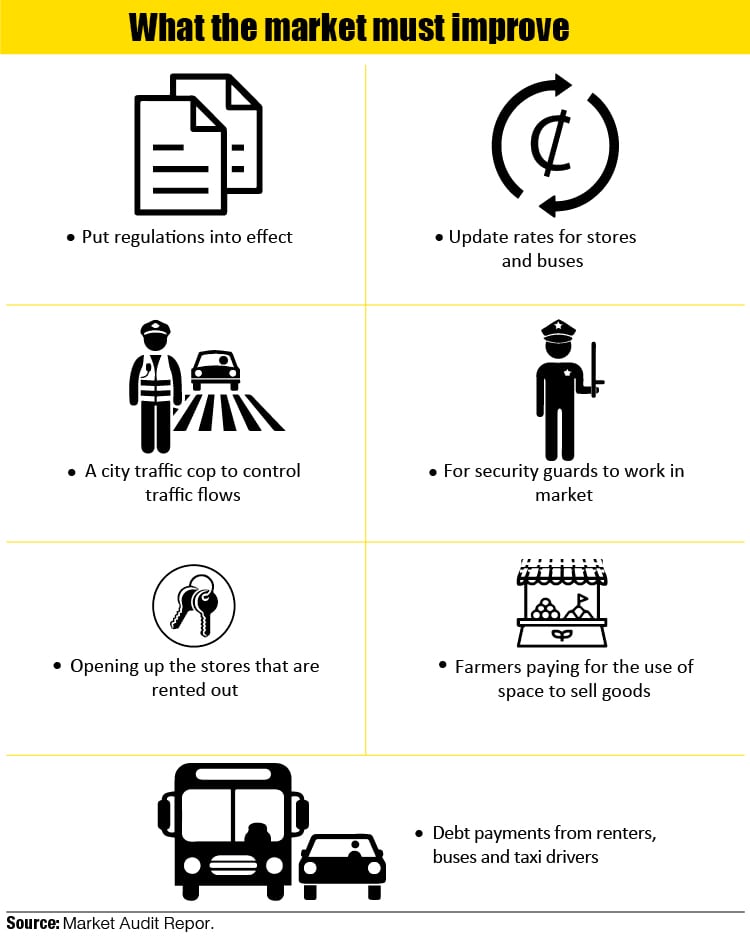
If you frequently take buses to Nicoya’s beaches, you’ve surely noticed the chaotic traffic that surrounds your departure. Buses, taxis, cars and street vendors take over the terminal. Add in the vendors at the Friday farmers market.
During farmers markets, in the afternoon, I have to stand out there like a traffic cop,” says Iliana Fajardo, who manages the Nicoya municipal market, located in the canton’s downtown.
Walking a few meters into the building is enough to see the panorama of chaos. Few people are sound inside. Shops are closed and plastic bags hang like makeshift curtains.”
“The movement is outside,” says a shoemaker and tenant of this public area as he puts the sole on a sandal. “This barely provides enough to survive,” he adds, referring to his work.
The chaos outside and inside stems from the same roots. Ever since the creation of this market in 1988, there has never been a set of city regulations that specifies how it should function, how to assign stores or sections or who has the right to use the bus terminal.
For years, it didn’t have a manager, says interim mayor Adriana Rodríguez. In 2015, when the current manager Iliana Fajardo began, the debt of tenants had reached ¢18 million ($31,500). In three years, she was able to reduce the debt by charging outstanding payments, but tenants still owe ¢8 million ($14,000).

In order to reduce the chaos, Fajardo says she is sure that someone will have to leave the property — either the farmers market or some of the bus companies.
There’s no longer enough space. You’d like to accommodate everyone, but demographic growth doesn’t allow for that,” she says.
Currently, the regulations are under review by the city council. Once they are approved there, the city will publish it in La Gaceta and it will become binding.
With this set of regulations, Nicoya City Hall will bring order to the administration and collect more revenue to invest in the property and other projects for the canton.
City Auditor Keylor Solórzano, in charge of overseeing public funds, explains its:
The more money (the local government) it has, the more it can invest in and dream up the Nicoya that we want.”
In April, Solórzano did a study about the market, which reopened the conversation of the market situation between the city council and the city administration.
Slow, Insufficient Steps
Since Fajardo took over in 2015, floors, ceilings, bathrooms, security cameras, cleaning, lighting and revenue collection have been repaired and improved. The administration’s annual reports are evidence of this. Revenues grew to ¢33 million ($58,000) in 2017 from ¢18 million ($31,500) in 2013.
 But the debts haven’t been a big enough reason to evict those who are behind on payments. Fajardo says that it is better for finances if these people to pay their debts little by little. If they are evicted, they would have to auction off the stores and that would mean more loses because of the period of time they remain closed.
But the debts haven’t been a big enough reason to evict those who are behind on payments. Fajardo says that it is better for finances if these people to pay their debts little by little. If they are evicted, they would have to auction off the stores and that would mean more loses because of the period of time they remain closed.
In addition to the losses, add in the fact that the rates that tenants pay haven’t been updated in at least five years. An appraisal committee of city officials and market tenants needs to be formed in order to do this.
The same thing needs to happen with the rates that buses pay, which hasn’t been updated since 1999. Some don’t pay what they are charged annually.
“(The buses for) Corralillo and Caballito pay ¢36,000 ($63) per year and they owe me two years,” Fajardo says.
The farmers at the market, who work on Friday, also don’t pay for using the municipal property. According to Solórzano, the new regulations should also charge these people a fee.
If you are profiting from a public space, you should pay a percentage of that,” said Solórzano, who was previously the financial manager for the local government.
Empty Spaces
Of the 46 shops in the market, four of them have been unoccupied for at least a year. They don’t have tenants because there was no budget — until 2018 — to auction them off, which is how spaces are rented on city property.
“I can’t assign a shop with my finger because it’s not my responsibility and I would be breaking the law,” the manager says.
According to City Supplier Teresa Fallas, there will be new tenants in two months because there is now a budget for an auction.
Another three shops will remain mostly closed despite being assigned to someone. Those who lease them don’t always open, because, according to the manager, they have family or health problems. “You have to be human,” she says.

Vicious Circle
The administrative mess also ends up affecting tenants. For example, they lost two guards who are supposed to look after the place because the city moved them to the municipal building in front of the park.
Now they must pay ¢2,000 ($3,5) per month for a private guard, despite the budget for the market having a space dedicated to covering this expense.
Fajardo explained that these two functionaries retire next year and the social expenses are going to have to be included in the budget.
I don’t know what I’m going to do because in terms of the budget, the social expenses for a pension are high,” Fajardo says. “It’s very difficult to find the money to work on projects.”







Comments